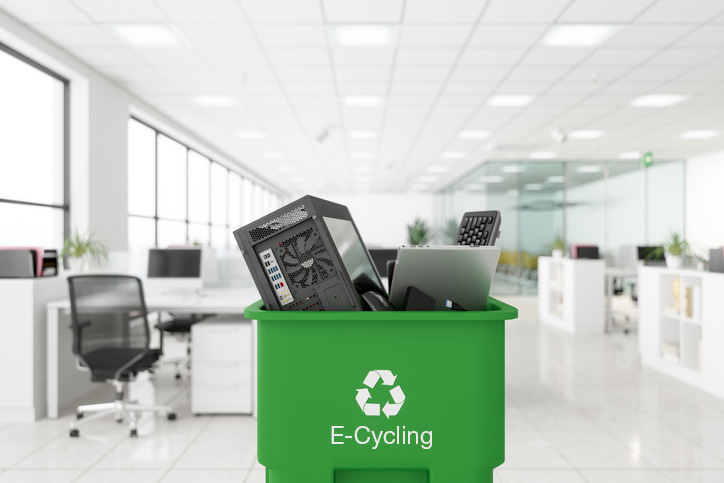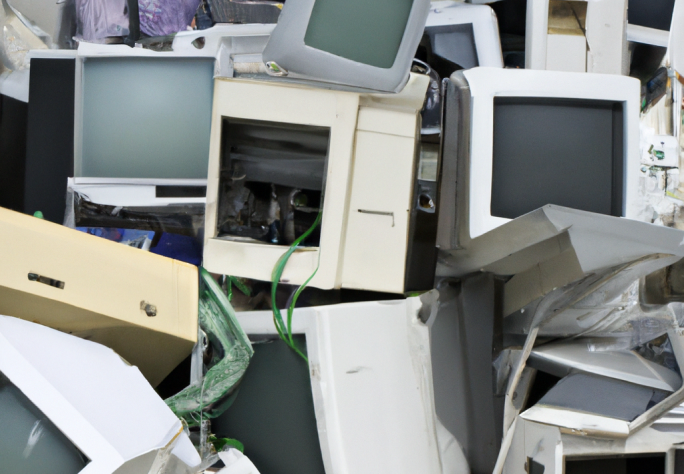Protect and Accountable Computer Recycling for a Greener Future
Protect and Accountable Computer Recycling for a Greener Future
Blog Article
Sustainable IT Solutions: Trustworthy Computer System Recycling Provider
As technology remains to advance at a fast pace, the issue of digital waste, or e-waste, has actually come to be a pressing problem for both people and organizations alike. The improper disposal of computer systems and various other electronic devices not only adds to ecological deterioration, yet also positions substantial threats to human wellness. Because of this, the requirement for credible computer reusing solutions has never ever been more extremely important. In this conversation, we will check out the environmental effect of e-waste, the benefits of responsible computer system recycling, exactly how to choose a trustworthy recycling solution, the recycling process for computers and electronic gadgets, and the role of government regulations in e-waste monitoring. Join us as we discover the sustainable IT services that can assist us browse the intricacies of electronic waste in a responsible and trusted fashion.
The Environmental Impact of E-Waste
The inappropriate disposal of digital waste, typically called e-waste, has substantial environmental implications. E-waste describes disposed of digital tools such as televisions, smart devices, and computer systems (computer recycling). These gadgets include harmful materials such as lead, mercury, cadmium, and brominated flame resistants, which can be hazardous to both human health and wellness and the setting if not properly managed
When e-waste is incorrectly dealt with, it often finishes up in landfills or is incinerated, launching toxic substances into the air, soil, and water. The launch of these harmful products can pollute groundwater, contaminate the air, and contribute to dirt degradation, posing severe health and wellness dangers to nearby areas and environments.
Moreover, the inappropriate disposal of e-waste additionally adds to the exhaustion of natural deposits. computer recycling. If properly reused, numerous digital tools contain important metals like gold, silver, and copper that can be recuperated and reused. However, when e-waste is not reused, these valuable resources are shed, and the need for brand-new resources increases, resulting in enhanced mining activities and additional ecological destruction.
To minimize the ecological effect of e-waste, appropriate recycling and disposal approaches must be used. This consists of the responsible collection, dismantling, and recycling of digital gadgets to recoup beneficial materials and make certain the safe administration of unsafe compounds. Executing efficient e-waste management methods is important to shield the environment, save resources, and advertise a lasting future.

Benefits of Accountable Computer Recycling
Correctly recycling computers offers a wide range of benefits, including environmental conservation and resource preservation. Accountable computer system recycling not only assists prevent electronic waste from finishing up in garbage dumps, yet it also reduces the requirement for raw products and energy in the manufacturing of new tools.
Among one of the most considerable advantages of liable computer system recycling is the preservation of the setting. When electronic waste is poorly taken care of, it can launch harmful compounds such as lead, mercury, and cadmium into the soil and water, posing a risk to ecological communities and human health and wellness. By reusing computers, these damaging materials can be securely extracted and taken care of, lessening the threat of air pollution.
An additional benefit is resource conservation. Computers contain useful products like gold, silver, copper, and light weight aluminum, which can be recovered and reused through recycling processes. By removing and recycling these products, the need for mining new sources is lowered, saving natural resources and decreasing the environmental influence of resource removal.
Additionally, liable computer system reusing aids to minimize power intake. Manufacturing brand-new computer systems calls for a significant amount of energy, from the extraction of raw materials to the assembly process. By recycling computers and reusing their components, the energy-intensive manufacturing process can be avoided, resulting in a reduction in greenhouse gas emissions and a more sustainable use of energy sources.
Just How to Pick a Trustworthy Computer Recycling Solution
When choosing a computer recycling service, it is important to consider a few key factors to guarantee that you choose a trustworthy and reputable supplier. Information safety is an important worry when reusing computers, as sensitive information saved on old tools can be prone to i loved this theft or misuse. By taking into consideration these variables, you can pick a computer recycling solution that is honest, trustworthy, and ecologically responsible.
The Recycling Process for Computer Systems and Digital Gadgets
To guarantee responsible disposal and decrease environmental impact, recognizing the reusing process for computer systems and electronic gadgets is essential when choosing a trustworthy recycling solution. The reusing process for these tools commonly includes several phases.
Firstly, the tools are gathered from people, companies, or drop-off points. This collection process might include transport logistics and safe handling to safeguard the sensitive information contained within the tools. Once accumulated, the devices are arranged based upon their type, such as desktops, laptop computers, or smartphones.
After sorting, the gadgets undertake a detailed data damage procedure to ensure that any type of individual or delicate info is permanently erased. This step is critical to shield the privacy and safety of companies and individuals. Information destruction approaches may include cleaning, degaussing, or physical devastation of the storage space media.
Following, the devices are taken apart into their private parts. This enables the splitting up of various products, such as plastics, steels, and circuit boards. These materials are then sent out to specialized recycling centers for more handling.
The recycling facilities use various techniques to draw out useful products from the electronic waste. These products can be recycled or repurposed in the production of brand-new items. The continuing to be waste is thrown away in an eco liable fashion, sticking to governing standards.
The Duty of Government Rules in E-Waste Management
Government guidelines play a additional resources critical duty in the reliable monitoring of e-waste. With the constant growth of the electronics industry and the raising problem for environmental sustainability, the requirement for proper disposal and recycling of digital waste has become much more evident. Federal government guidelines assist to guarantee that e-waste is managed in a liable and lasting fashion.
One of the primary functions of government regulations is to establish requirements and standards for home e-waste administration. These policies define the appropriate methods for collection, transport, and recycling of electronic waste. By developing these standards, federal governments can guarantee that e-waste is handled in such a way that reduces its impact on the atmosphere and human health.
This includes applying take-back programs, where manufacturers are accountable for accumulating and reusing digital waste from consumers. These policies assist to move the worry of e-waste management from the private consumer to the market, making sure that digital waste is taken care of in a more sustainable manner.

Final Thought
In final thought, it is crucial to consider the environmental impact of e-waste and select a credible computer recycling service to sensibly get rid of digital gadgets. By adhering to government policies and participating in appropriate recycling processes, we can mitigate the negative results of e-waste on the setting and advertise a more sustainable future.
In this conversation, we will certainly discover the ecological effect of e-waste, the benefits of responsible computer recycling, just how to pick a reliable recycling solution, the recycling procedure for computers and digital devices, and the function of government regulations in e-waste management. Computer systems have beneficial products like gold, copper, light weight aluminum, and silver, which can be recuperated and reused via reusing processes.Additionally, responsible computer system recycling helps to lower energy consumption. Information safety is an important worry when recycling computer systems, as sensitive details kept on old devices can be at risk to burglary or abuse. By thinking about these variables, you can pick a computer recycling solution that is ethical, trusted, and ecologically responsible.
Report this page